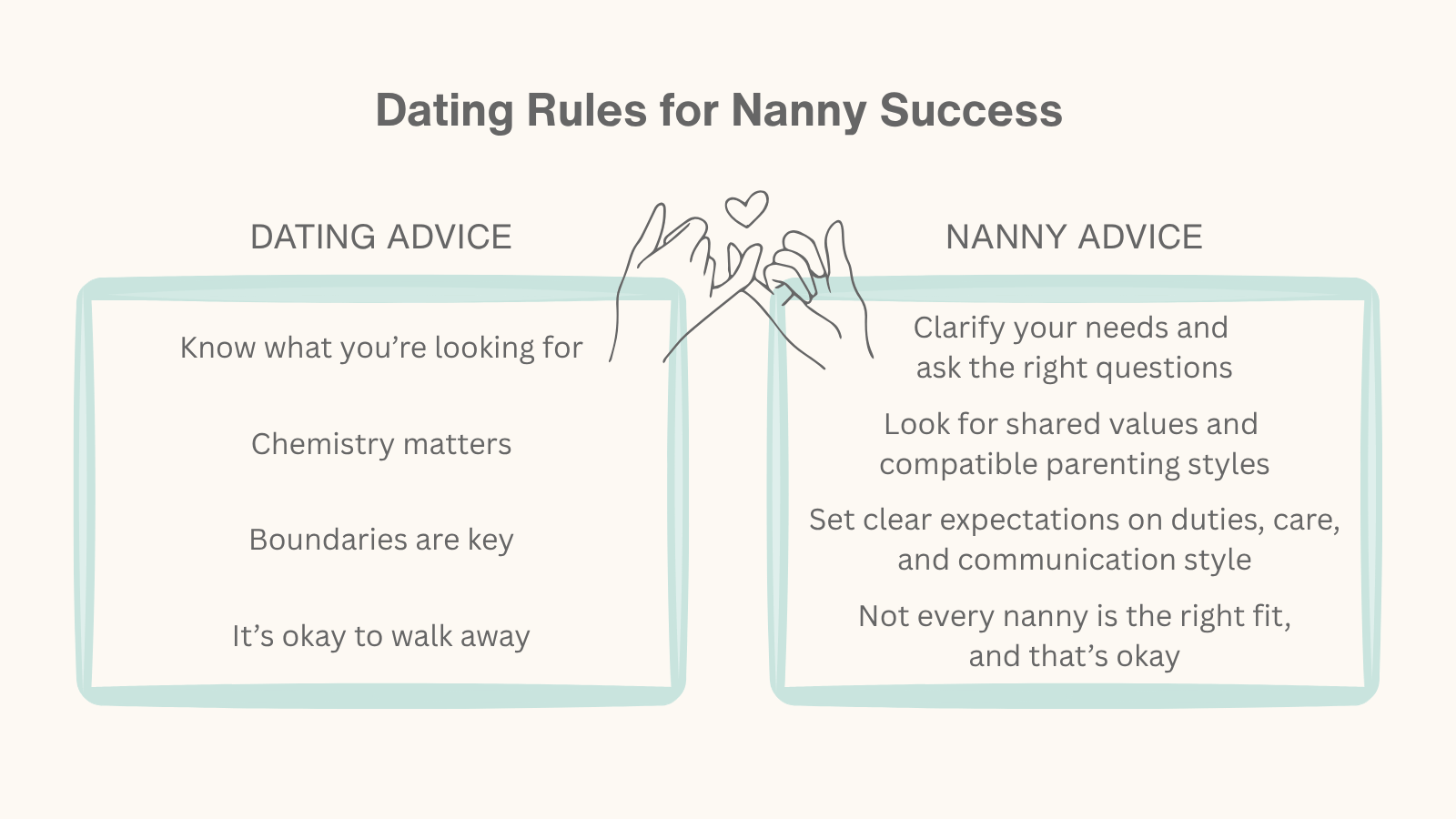
The Nanny Date
Listen to This Post
Seeing Beyond the Role
When you hire a nanny, you’re not just filling a job, you’re inviting someone into one of the most personal spaces of your life: your home, your family, your children’s hearts. And yet, many parents approach this decision the way we shop for services: fast, transactional, and focused on surface details. But hiring a nanny is more like dating than shopping. It takes communication, trust, and sometimes a few mismatches before you find the right fit.

Why Shopping for a Nanny Doesn’t Work
You want someone who can spark curiosity, encourage kindness, and bring calm when the world feels overwhelming. Someone who will shape your children’s days, their emotions, and the way they see the world. You want to give them the best of the best. It’s why you spend time researching the right toys, the right books, the right activities. Modern parenting comes with big dreams, you’re not just looking for supervision. You’re looking for a guide, a steady presence, a companion.
But too often, we focus on the measurable. We create checklists to feel in control: hourly rate, schedule, and availability. We treat childcare like a transaction, something to arrange, to manage, to coordinate. But hiring a nanny isn’t like booking a service. It’s about building a relationship, one that shapes not just the daily routine but the emotional landscape of your child’s life.
And when the focus stays on surface details, small but meaningful problems often arise, things no checklist could have predicted. The quiet discomforts. The awkward gray areas. The moments when something feels off, but no one knows how to name it. These are the things we rarely think to ask about, yet they’re often the reason so many nanny situations don’t work out.
"At first, it seemed innocent with Maria playing children's songs that mentioned God, so I let it go. I didn't want to make a big deal out of nothing. But over time, I think she's gotten a bit too comfortable and I feel that it's my fault for not squashing this early on."
— Reddit user, r/Parenting, February 18, 2025
"Our nanny doesn’t give us any updates on our child at the end of the day. Sometimes she doesn’t say a word to us before leaving or will only answer in yes/no responses when we ask how the day was."
— Reddit user, r/Mommit, December 2, 2021
"My baby is 4.5 months old and I recently saw the nanny kissing him on the forehead through the baby monitor while rocking him to sleep. It made me a little uncomfortable but I’m not sure if I’m overreacting."
— Reddit user, r/Parenting, October 11, 2024
What do you think matters most when building a strong nanny-parent relationship?
Current Results:
The Cost of a Mismatch: Expectations vs. Reality
Even when everything looks perfect on paper, finding the right nanny is rarely a one-and-done deal. Many families learn this the hard way. For some, it’s their first time having a nanny in their home, or their first time stepping into the unfamiliar role of managing someone else. And because of that, it’s not always clear how to find your place in this new dynamic, and learning how to navigate this new relationship takes time.

While there’s no official federal statistic for nanny turnover, industry estimates suggest it can reach 30–40% annually, often due to misalignment in expectations or unclear role boundaries. This means many families cycle through multiple caregivers before finding the right fit, learning along the way not just what their nanny needs, but what they need as parents.
With average hourly rates ranging from $20 to $35 an hour, replacing a nanny is never a no-consequence decision. Often, it means added expenses, new training, and emotional adjustment for you and your child.
- High Cost of Turnover: Hiring a new nanny can take 2 to 6 weeks and, if using an agency, may cost families between $1,500–$5,000 in placement fees alone.
- Average Nanny Pay: In 2025, U.S. families pay an average of $827 per week (about $20.68/hour) for full-time nanny care for one child.
- Role Misalignment is Common: According to the International Nanny Association, unclear expectations and communication issues are among the most common reasons for nanny departures.
- Burnout Risks: Emotional burnout from blurred boundaries or unrealistic demands is a key factor in nanny turnover, as highlighted by the U.S. Nanny Institute.
- Emotional Impact on Children: Frequent caregiver changes can disrupt attachment development, which is linked to emotional insecurity in young children (Harvard Center on the Developing Child).
Building Trust, Not Perfection
Trust your instincts, they’re often right. If something feels off, it’s worth pausing and having the conversation early, before this innocent "nothing" grows into a big "something". But at the same time, it’s important to remember that every nanny relationship is just that: a relationship.
One that develops, shifts, and changes as your child grows. That’s why open communication and clear boundaries matter so much. The more you can name your non-negotiables, whether it’s screen time, sleep routines, or updates during the day, the easier it is for both sides to feel secure, respected and aligned as this relationship evolves.

For many parents, especially those hiring a nanny for the first time, it’s normal to feel uneasy about leaving your baby with someone new. Feelings of jealousy, guilt, or anxiety are human. You can ease this transition with simple, practical steps:
- Provide structured outings for your child such as free park visits or library classes.
- Consider practical tools like an AirTag on the stroller or a baby monitor to help you stay connected and aware.
- Leave a written list of your child’s routine, favorite toys, and feeding schedule to ensure smooth care while you're away.
At the same time, it’s just as important to remember that nannies are human beings, not robots. Just like you, they need moments to catch their breath. And just like you, sometimes they need to call a friend or check in with family when the day feels overwhelming. Not every moment with a child needs to be filled with structured activities. In fact, independent play isn’t just healthy, it’s essential for children to explore, imagine, and build confidence and creativity.
Giving both the caregiver and the child space to be themselves makes the day smoother for everyone. Because when too many household errands or unspoken expectations pile on, it can take away from the quality of care and lead to burnout, something that ultimately affects everyone, including your child.
That's why it's worth remembering, finding the right nanny isn’t about perfection. It’s about building a relationship grounded in trust, communication, and mutual respect, one that can evolve and adapt as your family’s needs change.
More Parent Perspective

Parent Perspective
Buying Back Time: Is Paying for Childcare Really Worth It?
Would you work just to pay the nanny? For many parents, it feels like their entire paycheck disappears into childcare. But the hidden trade‑offs, health insurance, career momentum, and even sanity, tell a bigger story.

Parent Perspective
Inviting a Stranger into Your Home
Sometimes you’re not only bringing home a new baby, but also a night nurse or a live-in nanny. Creating a whole new kind of family dynamic, almost overnight.

Parent Perspective
Politeness and Privilege
Good manners aren’t new, but their meaning and impact are changing. A look inside how etiquette, opportunity, and childhood intersect.
Whether you're a parent looking for the right fit or a nanny navigating boundaries, the Connection Checklist helps both sides get clear on what matters most, before day one. Because when expectations are shared, trust can grow.

Written by Sylwia Glinska
Founder of Bottles & Bytes • Nanny, Newborn Care Specialist & Childcare Consultant
Get To Know Me